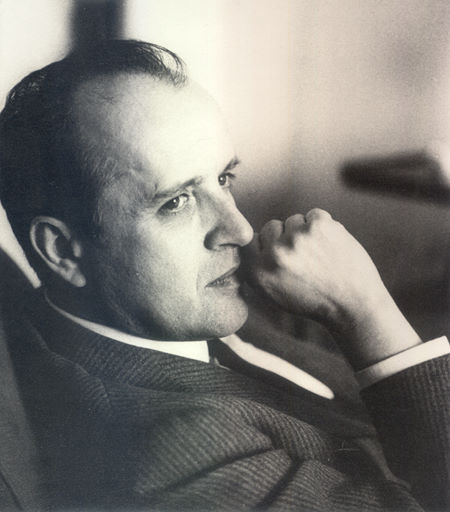Composer Nino Rota (1911 – 1979) was born into a family of musicians in Milan. He was initially a student of Giacomo Orefice and Ildebrando Pizzetti until he moved to Rome while still a child and completed his studies under Alfredo Casella at the Conservatory of Santa Cecilia in 1929. In the meantime, he became an enfant prodige, famous as both a composer and a conductor. His first oratorio, L’infanzia di San Giovanni Battista, was performed in Milan and Paris as early as 1923, and his lyrical comedy, Il Principe Porcaro, was composed in 1926.

Composer Nino Rota
Follow concert updates and news on the Nino Rota page on Schott Music’s website.
Questions or comments? Please contact us here.
Education
From 1930 to 1932, Rota lived in the U.S.A. He won a scholarship to the Curtis Institute of Philadelphia and studied composition under Rosario Scalero and orchestra under Fritz Reiner.
Rota returned to Italy and earned a degree in literature from the University of Milan. In 1937, he began a teaching career that led to the directorship of the Bari Conservatory, a title he held from 1950 until his death in 1979.
Operas, Ballets, and Orchestral Compositions
After his ‘childhood’ compositions, Rota wrote the following operas: Ariodante (Parma 1942), Torquemada (1943), Il cappello di paglia di Firenze (Palermo 1955), I due timidi (RAI 1950, London 1953), La notte di un neurastenico (Premio Italia 1959, La Scala 1960), Lo scoiattolo in gamba (Venezia 1959), Aladino e la lampada magica (Naples 1968), La visita meravigliosa (Palermo 1970), and Napoli milionaria (Spoleto Festival 1977).
He also wrote the following ballets: La rappresentazione di Adamo ed Eva (Perugia 1957), La Strada (La Scala 1965), Aci e Galatea (Rome 1971), Le Molière Imaginaire (Paris and Brussels 1976) and Amor di poeta (Brussels 1978) for Maurice Bejart.
In addition, countless of Rota works are performed worldwide.
Film Scores
Rota’s work in film dates back to the early forties and his filmography includes virtually all of the noted directors of his time. The first of these is Federico Fellini. Rota wrote the scores for all of Fellini’s films from The White Sheik in 1952 to The Orchestra Rehearsal in 1979.
Rota also collaborated with other directors, including Renato Castellani, Luchino Visconti, Franco Zeffirelli, Mario Monicelli, Francis Ford Coppola (he received the Oscar for Best Original Score for The Godfather II), King Vidor, René Clément, Edward Dmytrik and Eduardo de Filippo. Additionally, he composed the music for many theatre productions by Visconti, Zefirelli and de Filippo.
Nino Rota Foundation and Digital Archive
In February of 1995, the Nino Rota Foundation was established at Fondazione Cini of Venice, Italy. Cini specializes in the works of 20th-century Italian composers and includes the estate of Alfredo Casella.
The Nino Rota Digital Archive of the Istituto per la Musica at Fondazione Cini contains letters, news clips, images, and reviews in a searchable database.
Biography of Nino Rota
A biography of Nino Rota was published with Feltrinelli in November 2024: Nino Rota, Storia del mago Doppio e della fata Giglia (Nino Rota, The Double Wizard and the Lily Fairy) by Francesco Lombardi.

Driven by scrupulousness, competence and passion, Francesco Lombardi goes through this volume using mostly unpublished documents and testimonies that reconstruct the parable of a legendary artist. The great artistic and human adventure of a legend of twentieth-century music: Nino Rota.
A child prodigy, a pupil of illustrious masters, a protégé of Toscanini, a friend of Stravinsky and other stars of the international musical firmament, Nino Rota is an unparalleled protagonist of twentieth-century Italian music. In a musical context – that of the first decades of the twentieth century – very sensitive to the avant-garde movements then in vogue, Rota seems to swim alone against the current and looks with pleasure back, rather than forward. Unlike other composers, he accepts the demands and limits imposed by film patrons without too much opposition.
More than one hundred and fifty soundtracks were born from this, some of which have made the history of Italian cinema – La Dolce Vita, The Leopard – and international cinema – The Godfather, Romeo and Juliet. His concert music and his operas, whose untimeliness is often noted with rancour by contemporary critics, still have a stable place in the world repertoire today. Rota’s life was very intense, made up of very strong family ties, very close friendships and collaborations with some of the greatest artists of his time, from Fellini and Visconti to De Filippo, Béjart, Coppola and Zeffirelli.
Trailer – Aladdin and the Magic Lamp by Nino Rota performed by Oper Leipzig
Browse by Category
Browse Nino Rota's catalogue by selecting a category:
Advanced Search
Search Nino Rota's catalogue for specific keyword(s):
This Is Not A Commercial Site
Nothing is being sold here.
Please contact the appropriate publisher or label for information about specific works.



